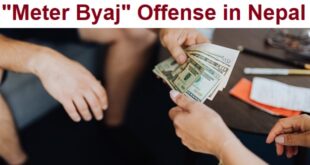Introduction
Untouchability is a worldwide socio-cultural problem mostly on basis of race. In Nepal, Dalits form the groups which have received the most inhuman treatment and maltreatment from the so-called ‘high castes’ through caste-based discrimination, including untouchability.
In practice, untouchability means avoidance of physical contact with persons of lower castes grounded in the caste system of Hinduism that contacts with lower caste people pollute the upper caste people.
Constitutional Safeguard
The Constitution of Nepal (2015) has prohibited all kinds of untouchability and discrimination on grounds of caste, ethnicity, origin, community, occupation, or physical condition in any private or public place.[1] Racial discrimination should not be encouraged in any way, engorgement of incitement of untouchability is also punishable. All forms of untouchability or discrimination are punishable by law as a serious social crime, and the victim has the right to compensation as provided for by law.[2]
Preventive Legal Provision
The Caste-Based Discrimination and Untouchability (Offence and Punishment) Act, 2068 (AD 2011), authenticated on 1 June 2011 and the latest amendment 15 April 2019 deals with all forms of discrimination and untouchability.
Section 3 of this act restricted caste-based discrimination and untouchability such as;[3]
- Commission or causes to commit caste-based discriminations and untouchability,
- Aid, abet, incite or provoke anyone to commit caste-based discrimination or untouchability,
- Attempt to commit such an act,
Caste-based discrimination and untouchability refers as;[4]
- Any kind of discrimination,
- Any commission or cause to commit acts as mentioned above on the ground of custom, tradition, religion, culture, rituals, caste, race, descent, community or occupation,
- Commission or cause to commit such acts in public or private sphere (place) against a person,
- To prevent, control or restrict anyone in any way from entering, attending, or participating in custom, tradition, religion, culture, rituals, caste, race, descent, community or occupation,
- To expel anyone individually or collectively from a public place or public occasion or to commit social exclusion,
- Deprive a person of using or enjoying public service on the ground of caste, race, descent, community or occupation,
- Deprive a person of organizing public occasion or performing any act to be organized publicly,
- Instigate or provoke anyone to commit such an offense.
- To prohibit anyone to carry on profession or business or compel anyone to carry on any occupation or business,
- To deprive any one of performing any religious act,
- To prevent anyone from producing selling or distributing any goods, services, or facilities,
- To prevent a person from entering into the house or evict from the house or village, or compel to leave the house or village,
- To prevent a person of marriageable age pursuant to prevailing law from getting inter-caste marriage; or shall deny to perform a naming ceremony for the person born from such marriage or compel or cause to compel for divorce,
- Transmit the views based on caste- supremacy or hatred or use derogatory words or indicate thereof,
A complaint or First Information Report (FIR)
A person, who finds that someone has committed or is going to commit an offense of discrimination and untouchability can file a complaint in;
- nearby policy office as prescribed,
- or nearby police office of the area where the victim resides or of the district where the defendant resides,
- If the concerned police office denial to register the complaint, the concerned person can complain to National Dalit Commission or local body in the prescribed manner,
Penalty
The person who commits offense may be liable to;
- the punishment of imprisonment for a term from Three months to three years or the fine from One Thousand Rupees to Twenty Five Thousand or the both,
- the imprisonment for a term from one month to one year or the fine from Five Hundred Rupees to Ten Thousand Rupees or the both,
- half of the punishment prescribed to the principal offender, who aids, abets, or instigates anyone to commit caste-based discrimination or untouchability or attempt,
- the punishment of an additional Fifty percent to the punishment as mentioned to a person holding a public post,
Muluki Penal Code, 2074 (2017)
Section 160 of this code also deals with offenses relating to Discrimination and Other Degrading Treatment. It is prohibited to intentionally make a discriminatory treatment against any citizen on grounds of origin, religion, color, caste, race, sex, physical condition, disability, condition of health, marital status, pregnancy, economic condition, language or region, ideology, or on similar other grounds.[5]
Conclusion
Government of Nepal to be plaintiff of offense-related discrimination and untouchability.
The cases of caste-based discrimination and untouchability are diluted because of hierarchal society with the use of threats and counter-charges. In these offenses, perpetrators are always more powerful than victims, who are Dalits, because Dalits have their position at the bottom in Nepal’s socio-economic structure.
Therefore, the law enforcement agencies need to have basic this understanding and create safe spaces for victims to be able to present and defend their cases.
Discrimination and untouchability offenses are a few of the most sensitive issues. Therefore, all stakeholders should perform their duties and responsibilities honestly. Society, witnesses, and any other people should not take sides of injustice that happens in their communities.
Reference
[1] Constitution of Nepal (2015), article 24 (1)
[2] Ibid article 24(2), (3), (4) & (5).
[3] The Caste-Based Discrimination and Untouchability (Offence and Punishment) Act, 2068 (AD 2011), sec. 3.
[4] The Caste-Based Discrimination and Untouchability (Offence and Punishment) Act, 2068 (AD 2011), sec. 4.
[5] The National Penal (Code) Act, 2017
 Nepali Law A complete legal information portal
Nepali Law A complete legal information portal
